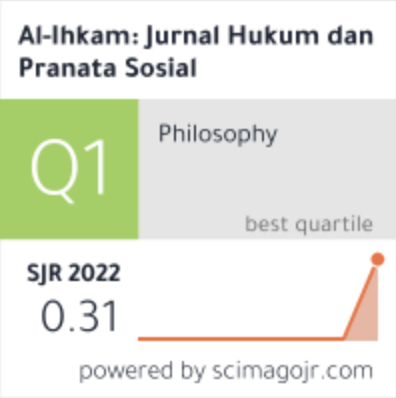Fiqh And Custom Negotiation In Inheritance Dispute Tradition At Mataraman Society, East Java
 Abstract views: 755
,
Abstract views: 755
,
 PDF downloads: 446
PDF downloads: 446
Abstract
This article reveals the negotiation model in inheritance dispute resolution among Mataraman society at East Java as a response to the high number of inheritance dispute which often becomes an acute family social problem. Conducting field research on seven families carrying out inheritance distribution process, this article classifies three models of Mataraman society’s negotiation in inheritance dispute resolution. They are negotiation using formulation of theology cum tradition, negotiation using fiqh cum tradition, and negotiation using indigenous wisdom and diversity. Among the three, the formulation of fiqh cum tradition comes as the mainstream solution and offer because it is a middle way to resolve inheritance disputes for the sake of assets unity and harmonious family relationship. It also becomes a role model for social based negotiation process for inheritance distribution in a multicultural society.
(Artikel ini menggali model negosiasi dalam penyelesaian sengketa waris pada masyarakat Mataraman Jawa Timur sebagai respons atas tingginya angka sengketa waris yang muncul di masyarakat dan acapkali menjadi sengketa akut sosial keluarga. Dengan melakukan riset lapangan terhadap tujuh keluarga yang mengalami proses pembagian waris, artikel ini mengklasifikasi tiga model formulasi dalam proses negosiasi penyelesaian sengketa waris di masyarakat Mataraman. Ketiganya adalah negosiasi dengan formulasi teologi agama cum adat, negosiasi dengan formulasi fiqh cum adat, dan negosiasi dengan formulasi kearifan dan keragaman lokal. Dari ketiga formulasi tersebut, model fiqh cum adat menjadi tawaran sekaligus solusi mainstream karena merupakan jalan tengah penyelesaian sengketa waris di masyarakat demi keutuhan aset dan keharmonisan hubungan keluarga. Kategori tersebut sekaligus menjadi role model atas proses negosiasi dalam tradisi pembagian waris berdimensi sosial dalam masyarakat multikultur)
Downloads
References
Ainiyah, Qurrotul, Syarifah Marwiyah, and Sri Lumatus Sa’adah. “Pembagian Waris Etnis Madura Terhadap Anak Luar Nikah Di Dusun Kebonan Kecamatan Yosowilangun Kabupaten Lumajang.” Al- Ihkam 11, no. 2 (2016): 359.
Badowi. “Interview.” 2020.
Basri, Cik Hasan. Pilar-Pilar Penelitian Hukum Islam Dan Pranata Sosial. Jakarta: Rajawali Press, 2004.
Basyir, Ahmad Azhar. Hukum Waris Islam. Yogyakarta: Fakultas Ekonomi UII, 1990.
Berkah, Dian, and Tjiptohadi Sawarjuwono. “Inherintence Wealth Distribution Model and Its Implication to Economy.” Humanities & Social Sciences Reviews 17, no. 3 (2019): 01–10.
Budi. “Interview.” 2020.
Chalik, Abdul. “Islam Mataraman and Its Political Orientation in the History of Elections in Indonesia.” Islamica 5, no. 2 (2011): 269.
Fuad, A. Jauhar. “Tlatah Dan Tradisi Keagamaan Islam Mataraman.” TRIBAKTI: Jurnal Pemikiran Keislaman 30, no. 1 (2019): 3–4.
Haar, Ter. Asas-Asas Dan Susunan Hukum Adat. Edited by Soebakti Poesponoto. Jakarta: Pradnya Paramita, 1983.
Hasani. “Interview.” 2020.
Hazairin. Hukum Kewarisan Bilateral Menurut Al-Quran Dan Hadis. Jakarta: Tintamas, 1982.
Hipni, Muhammad. “The Study of Maqâshid Syarî`ah toward Maduresse Traditional Inheritance by Using System Approach.” Al-Ihkam 14, no. 1 (2019): 68–69.
Ihsan. “Interview.” 2019.
Jamil, M Mukhsin. Mengelola Konflik Membangun Damai. Semarang: WMC IAIN Walisongo, 2007.
Kaplan, David. Teori Budaya. Edited by Landung Simatupang. Yogyakarta: Pustaka Pelajar, 2000.
Khalaf, Abdul Wahab. ’Ilm Ushul Al Fikih. Beirut: Dar al Mu’arrafah, n.d.
Leni, Nurhasanah. “Demokrasi Dan Budaya Politik Lokal Di Jawa Timur.” Jurnal TAPIS 8, no. 1 (2012): 23–24.
Marno. “Interview.” 2020.
Marzuki. “Interview.” 2020.
Mas’udi, Masdar Farid. Agama Keadilan Risalah Zakat (Pajak) Dalam Islam. Jakarta: P3M, 1991.
Matthew B Miles, A Michel Huberman. Qualitative Data Analysis. Jakarta: universitas Indonesia Press, 1994.
Mesiran. “Interview.” 2020.
Mudjib, Abdul. Principles of Fiqh Science (Al-Qowa’idul Fiqhiyyah). Jakarta: Kalam Mulia, 2001.
Muhaimin. “Interview.” 2020.
Permana, Sugiri. “Implications Munawir Sadjali and Hazairin Thoughts in Establishent of Islamic Inheritance in Indonesia.” AHKAM 18, no. 2 (2018): 392.
Sadjali, Munawir. Ijtihad Kemanusiaan. Jakarta: Paramadina, 1997.
Saebani, Beni Ahmad. Sosiologi Hukum. Bandung: Pustaka Setia, 2007.
Salam. “Interview.” 2020.
Samsul. “Interview.” 2020.
Saringatun. “Interview.” 2020.
Soekanto, Soejono, and Soleman. Hukum Adat Indonesia. Jakarta: Rajawali, 2002.
Soekanto, Soerjono. Sosiologi Suatu Pengantar. Jakarta: PT. Raja Grafindo Persada, 1982.
Suwito. “Interview.” 2020.
Syarifuddin, Amir. Hukum Kewarisan Islam. Jakarta: Prenada Media, 2004.
Vela, Anggita. “Inheritance Distribution in Javanese Society in Terms of Islamic Law and Its Impact.” As-Salam 4, no. 2 (2015): 79–80.
Widyasari, Tira. Praktik Pembagian Waris Di Kalangan Pemuka Agama Islam Di Kauman Kabupaten Magetan. Surakarta: Pascasarjana UNS, 2017.
Woodward, Mark R. Islam Jawa Kesalehan Normaif Versus Kebatinan. Yogyakarta: LKiS, 2004.
Yunita. “Interview.” 2020.
Zaidan, Abdul Karim. Al Wajiz Fi Syarhi Al-Qawa’id Al-Fiqhiyyah Fi Asy-Syari’ah AlIslamiyyah. Edited by Muhyiddin Mas Rida. Jakarta: Al-Kautsar, 2008.
In order to be accepted and published by Al-Ihkam: Jurnal Hukum dan Pranata Sosial, author(s) submitting the article manuscript should complete all the review stages. By submitting the manuscript, the author(s) agreed to the following terms:
- The copyright of received articles shall be assigned to Al-Ihkam: Jurnal Hukum dan Pranata Sosial as the publisher of the journal. The intended copyright includes the right to publish articles in various forms (including reprints). Al-Ihkam: Jurnal Hukum dan Pranata Sosial maintain the publishing rights to the published articles.
- Authors are permitted to disseminate published articles by sharing the link/DOI of the article at Al-Ihkam: Jurnal Hukum dan Pranata Sosial. Authors are allowed to use their articles for any legal purposes deemed necessary without written permission from Al-Ihkam: Jurnal Hukum dan Pranata Sosial with an acknowledgment of initial publication to this journal.
- Users/public use of this website will be licensed to CC-BY-SA.



.png)
_1.png)










